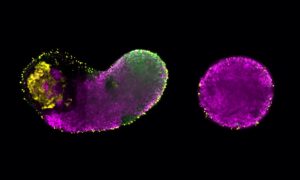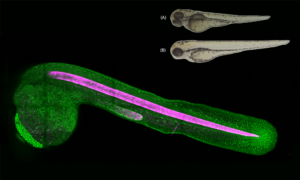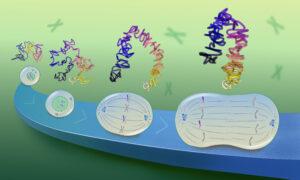Alleviating the burden of Multiple Sclerosis
Researchers discover a cellular signal that aggravates the symptoms of MS and might be targeted in new therapeutic approaches
Depression, coordination and speech problems, muscle weakness and disability are just a few of the symptoms of Multiple Sclerosis (MS). Researchers from the Mouse Biology Unit of the European Molecular Biology Laboratory (EMBL) in Italy and the Department of Neuropathology at the Faculty of Medicine, University of Göttingen, Germany, have now discovered that these symptoms are aggravated by a specific signal in cells in the nervous system. The study, which will appear in this week’s online issue of Nature Immunology, suggests that blocking the proteins that regulate the signal might be an efficient strategy for new therapies against MS.
Nerve cells in our brain and spinal cord communicate with each other using electrical signals. This communication is fast and efficient because – just like wires in an electrical circuit – the axons of our nerves are surrounded by an insulating layer. In MS this protective sheath, made up of a mixture of lipids and proteins called myelin, gets destroyed by cells of our own immune system, and the communication between nerve cells gets disrupted. A central player in the molecular mechanisms behind MS is a signaling molecule called NF-kB.
“We have known for a long time that NF-kB is crucially involved in MS,” says Manolis Pasparakis, a former Group Leader at EMBL’s Mouse Biology Unit who now works as a Professor at the Institute for Genetics at the University of Cologne, “but until now it was not clear if it was friend or foe. We were not sure whether it protects the brain cells against the consequences of the disease or actually aggravates the damage.”
To get a clear picture of NF-kB’s role in MS, Pasparakis and his scientific collaborators at the University of Göttingen investigated what happens to mice with an MS-like condition if the action of NF-kB is blocked. To shut down the signal they inactivated IKK2 and NEMO, two proteins that activate NF-kB.
“This was quite a challenge because NF-kB is involved in many crucial processes throughout the entire body, and shutting down its activation in all cells kills the mouse before it is born,” says Pasparakis, “To observe the effect of NF-kB in MS, we used sophisticated genetic techniques to generate mice that do not express IKK2 and NEMO in brain cells only.”
The results were mice that showed much milder MS symptoms than normal, an effect that is very likely to be linked to the lower amount of inflammatory messengers produced by their brain cells.
“NF-kB regulates the production of messengers that are released during inflammation to recruit and activate immune cells,” says Marco Prinz, whose group at the University of Göttingen collaborated in the research. “Generally this is a good strategy to protect the body from infections. But in MS it is exactly these immune cells that cause the problem and their hyperactivation through NF-kB only makes the situation worse.”
Blocking IKK2 and NEMO interfered with this pathological action of NF-kB and alleviated the symptoms of MS. This makes the proteins promising as potential drug targets for new therapies against the disease. The human NF-kB signaling network is very similar to that of mice, so that compounds that inhibit IKK2 and NEMO are likely to lead to the same alleviation of symptoms in humans.




